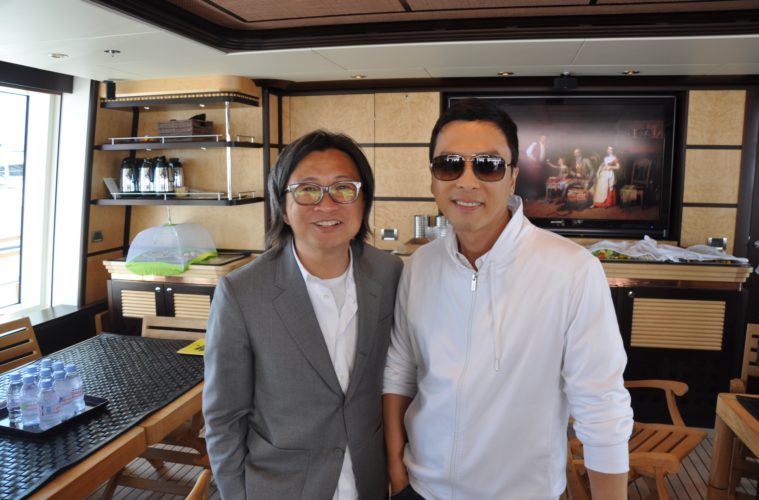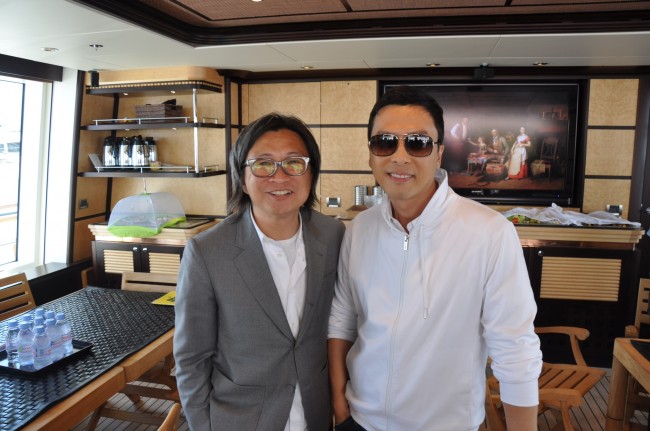
One of the highlights of my trip here in Cannes was walking aboard a million dollar yacht and interviewing martial arts icon Donnie Yen along with filmmaker Peter Chan, who directed Donnie in his latest film Wu Xia, or Swordsmen (our review here). Based on the classic wu xia style of films, a genre of Chinese fiction focusing on adventures of martial artists, made extremely popular by the prolific Shaw Brothers studio, the film is a perfect example of the unique and exciting cinema that could only come from China. Both Donnie and Peter were very gracious in explaining the challenges they faced in making this film, along with what makes their Wu Xia stand out above the rest.
The Film Stage: What inspired you to make this classic style of Wu Xia film?
Peter Chan: We actually tried to return to the old glory of the 1960’s and 1970’s martial arts film by the Shaw brothers, so in a way we were both big fans of that kind of film. It was from that starting point that we decided to do this and it was the first time in any of my previous development process that actually an idea like that or a style comes before the story, the script and the characters because most of my other projects have been densely plotted. And all the characters were multi-lead which takes 2 and a half hours just to get the story straight and we don’t really get to play with style and camera and fighting style, so this is a first time that we get to do it the other way around. The content is servicing the style rather than what it usually is.
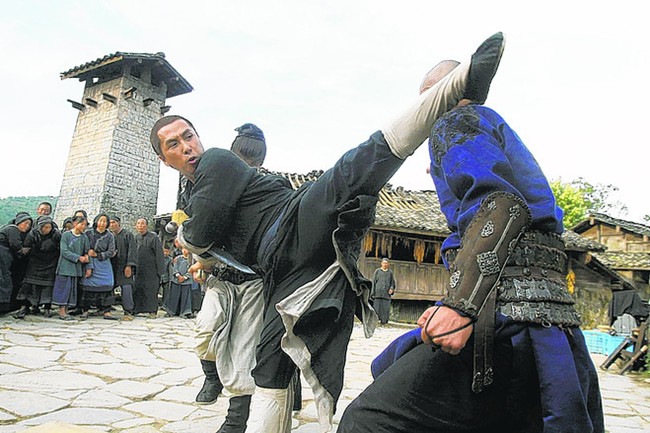 What is it about that style traditionally that appeals to you?
What is it about that style traditionally that appeals to you?
PC: I think that the key is that there is a certain charm and magic to old martial arts film. It’s traditional; it’s something about how people can do something that is humanly impossible. In a way it’s like a superhero movie. I always related to not just superhero movies, but sometimes even gangster movies or sometimes even crime movies in a way where we can do things that we wouldn’t normally do in real life. We could have the power of ten hundred times beyond what we could usually do. It’s a great feeling that if you get bullied and suddenly there are a hundred people behind you backing you up or you are Superman or Batman or whatever. I think in a way when we grew up as kids that’s the thing that…I mean I was very nerdy and small kid when I was young, so I think that sort of has something to do with it. It’s a sense of empowerment but at the same time because of the last 40 years, people keep doing the wu xia genre, the martial arts genre and we have to keep reinventing our self to make the audience happy who keeps wanting for more. Then we become more powerful and from straight shots comes choreography to cutting shots like 1 second, 2 second, shots that show the power. And then we start using trembling and out of that comes special effects, then the art of wu xia. So that art is gone and is substituted by special effects. Although there are a lot of great experiments in that genre and very great successes but it became totally at a world, for a kid, like myself, or when I was younger, or even now, who keeps asking questions about logic and its completely defined by any human possibility. So it’s actually an interesting irony that was what attracted me to genre, but that’s also something that got me, as I grew up, just got me more and more inquisitive and I started to not believe it. What happened was then I decided maybe we should go back to the origin of it but at the same time ground the possibility. Working with Donnie is a must for this film not just as an actor or as a martial artist, but more importantly as a partner in directing the movie because he directs all the action sequences. His action has also been the most powerful and it’s always been humanly possible. He never attempts to do things that completely defies logic, but at the same time you want to have another side to the classic wu xia genre. We decided to go into the anatomy, go into the medical aspect of it and I came across a Discovery channel documentary one day that shows a sniper shooting a bullet into a human body and it was completely CGI. It’s slow motion and depicts every step of the way how that bullet destroys a body and how it enters your vein, how it cuts though a certain body tissue and how it ultimately leads to heart failure and results in death.
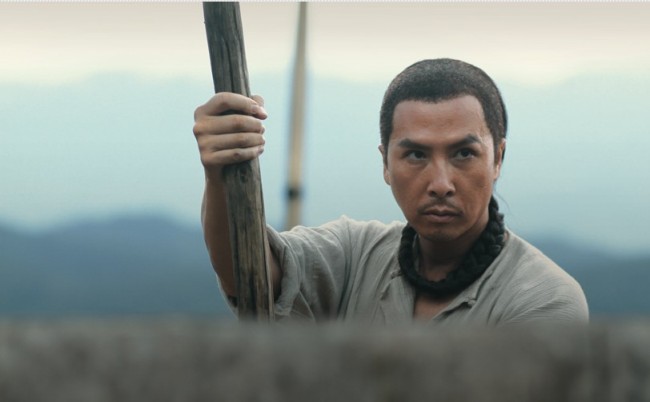 The film deals with a character who undergoes a dramatic transformation. Since you have had such a transformative career these past 10 years, was that something that attracted you particularly to this project?
The film deals with a character who undergoes a dramatic transformation. Since you have had such a transformative career these past 10 years, was that something that attracted you particularly to this project?
Donnie Yen: No. The name Peter Chan attracted me. I have always been a fan of Peter’s movies. I remember at the press conference I mentioned maybe 16-17 years ago, in Hong Kong in a hotel lobby, Peter was waving to someone, and I saw him and introduced myself to him. He knew who I was but I was never in his actors list. I introduced myself to him and said “I love your movies.” Deep inside I was wishing that he can cast me and then many years went by and we came across a project, bodyguards and assassins to be filmed and then one thing led to another and we built a relationship. He talked about directing a film and all these years I’ve been waiting for it.
There are lulls in the action in this film, were you ever worried that you might lose the audiences attention?
PC: I try to be innovative and try to be ground breaking in my movies whether acting or action directing, that is just my motive. I remember how some of the industry people and the people around me discussing, when you don’t see dinosaurs in Jurassic Park for 30 minutes and then it builds up to expectation and it finally appears, that’s really exciting. That’s why we had enough going in the beginning, where we had that little scene which I thought was masterful choreography. Then we also came to what we call the reveal, which is the revelation of what actually happened and what actually didn’t happen, but the imagination of Kaneshiro’s character. That was so perfect in a way that I thought we should just keep it at that and leave everything until Donnie is revealed, his character, when he fights with his stepmother in the plaza. Then its almost like that’s what the audience has been waiting for. It’s never been done and done well. For years I really wanted to escalate the standard of at least the audience point of view. All martial art films, you know all you see is a bunch of action but then to me, I think a good martial arts should be a good film itself, but then you got to find the right director and script. That’s when I was really excited to be able to work with him because I know he will bring everything together and escalate the whole genre.
Do you ever actually physically get beaten up?
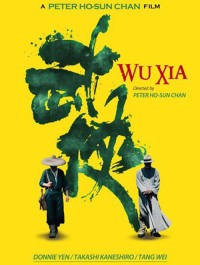 DY: There that a shot and we were working with this camera and its 500 frames per second. There were a bunch of people that operate it and you have to playback. It has six or seven seconds play back and the whole reel is gone by the time you do playback. It really depends on when the guy pressed the button because sometimes you push the buttons two seconds too late, you will get the playback just before it hits. Then the playback doesn’t mean anything. We are trying to catch the most realistic impact. You keep hitting and the guy is almost spitting out blood and we still only got the first 4 seconds of the whole shot. We are in the other room watching the playback and we hear this loud punch. You have to understand that these martial art films are very unique in Hong Kong. One of the reasons we emphasized the person doing martial art themselves which is different from Hollywood films. When I choreograph a fight scene for example, while getting hit or hitting the person, I’m trying to cross the line of bringing the most realistic effect. So that particular close-up shot, I ask my assistants to really hit that person, most of them are martial artists and start off as stunt men. It’s a scene where his tooth falls out and he understood what was about to happen. It was pretty intense. We told him you got to take it for real because that is the only way we can do it in one take. We can’t repeat it because I don’t want to repeat the shots. I’m experienced enough to not hurt the person. I asked my stunt guy to hit the person getting hit. I asked Peter to rent the most expensive camera. Thank God it wasn’t me. In the other room I heard the sound and knew we got the take. We were happy and then we saw that the person who was supposed to push the button didn’t push it so we had to redo the shot again. When I started off in the business I was the one getting hit, but now I’m the one hitting other person. It’s part of the job. It’s not as barbaric as people think. Its formal arts and you have to be experienced as an action director and always watching out for safety. None of our actors got injured and safety comes first. I only chose to have that person getting hit determined by whether that person is physically capable of withstanding the impact. I will always try to push the barrier.
DY: There that a shot and we were working with this camera and its 500 frames per second. There were a bunch of people that operate it and you have to playback. It has six or seven seconds play back and the whole reel is gone by the time you do playback. It really depends on when the guy pressed the button because sometimes you push the buttons two seconds too late, you will get the playback just before it hits. Then the playback doesn’t mean anything. We are trying to catch the most realistic impact. You keep hitting and the guy is almost spitting out blood and we still only got the first 4 seconds of the whole shot. We are in the other room watching the playback and we hear this loud punch. You have to understand that these martial art films are very unique in Hong Kong. One of the reasons we emphasized the person doing martial art themselves which is different from Hollywood films. When I choreograph a fight scene for example, while getting hit or hitting the person, I’m trying to cross the line of bringing the most realistic effect. So that particular close-up shot, I ask my assistants to really hit that person, most of them are martial artists and start off as stunt men. It’s a scene where his tooth falls out and he understood what was about to happen. It was pretty intense. We told him you got to take it for real because that is the only way we can do it in one take. We can’t repeat it because I don’t want to repeat the shots. I’m experienced enough to not hurt the person. I asked my stunt guy to hit the person getting hit. I asked Peter to rent the most expensive camera. Thank God it wasn’t me. In the other room I heard the sound and knew we got the take. We were happy and then we saw that the person who was supposed to push the button didn’t push it so we had to redo the shot again. When I started off in the business I was the one getting hit, but now I’m the one hitting other person. It’s part of the job. It’s not as barbaric as people think. Its formal arts and you have to be experienced as an action director and always watching out for safety. None of our actors got injured and safety comes first. I only chose to have that person getting hit determined by whether that person is physically capable of withstanding the impact. I will always try to push the barrier.
How do you hope American audiences will react to Wu Xia?
PC: Foreign films are tough anywhere and there is always a cycle where every ten years something happens. I don’t think we can rely on the fact that Asian film will continue to do well, but I think each film needs to find a hook and for this particular film, I’ve done this many times and learned it in the hard way. Most of my films are very densely plotted. When a film doesn’t work anywhere, its not the problem of the audience, its just whether you find the right audience. When you have a two and a half hour film filled with dialogue, then it is content over style. For foreigners it is not dialogue its subtitles, its like reading a novel. How do you expect the mass audience to go see it? Now the cost of marketing movies is extremely high and expensive and that will never change. The Weinstein Company is great at marketing, but Harvey is also the one that drives up the prices of distributing a movie.
Where does that leave this film?
PC: There’s a niche somewhere and I can’t say that I made it because this could go international but at least as a martial arts fan, I think this is something I would want to see and I think that the Chinese audience would be very excited about. If the western audience thinks they have seen movies like this, we have seen 10-20 times more and are still watching them. At least this is something that could give more and we invigorate the genre at least in China and I hope in the process, we can find an international audience. That would be great.
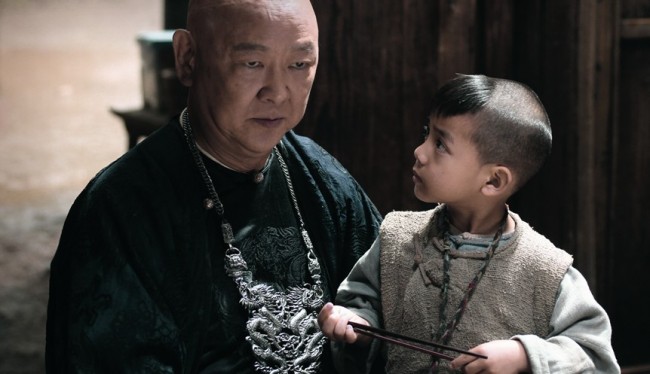 How do you feel about this subject based on what Peter was saying?
How do you feel about this subject based on what Peter was saying?
DY: Each film we create, I do a sense of style and flavor itself, especially Peter’s film. When we worked together before, we talked about finding a subject, telling a story where you can cross over to a mass audience instead of just the martial art fans and I think we have great potential based on the reviews. I was very proud to be part of this film and I hope it does cross over. It will be the perfect vehicle to expand.
PC: I think all cinema needs is new ideas and I was texting Donnie after our last movie because I knew he wanted to do something that would reach out to a bigger audience internationally and that film has no comparison to this one at all, but that film was District 9. Yes, that film is in English and not made within the studio system, and it’s a film that’s set in South Africa. We got to find a story that takes a genre in a completely new direction that you thought, “oh my God, the first 10 minutes is a Steven Spielberg movie condensed into 10 minutes of Newsweek and then the story begins.” It’s just amazing. We should try to find something that is actually from the genre that people are familiar with, but you got to find a new angle.
One of the things left in my mind after the film ended was that you were actually making an origin story for a remake of The One Armed Swordsman. Is there any credibility to that?
PC: There were a lot of speculations when we were getting ready to make the movie and the Chinese press kept asking if we are actually making The One Armed Swordsman and that was before we even asked Jimmy Wong to be in the movie because we are both big fans of the One Armed Swordsman and I kept denying it and when we were shooting the movie because we got Jimmy here. Then we were developing the script and improvising as we go, just before we shot the ending I said Donnie, “what are you going to do with the ending with the action?” We looked at Jimmy and he said, “why don’t we chop your arm off?” I think it’ll be a great homage to your film. The two of them were trying to figure out how to chop off the arm. There was no CGI involved.
DC: I will say this, I give a lot of credit to Jimmy Wong, because it is really difficult to fight with one arm!

